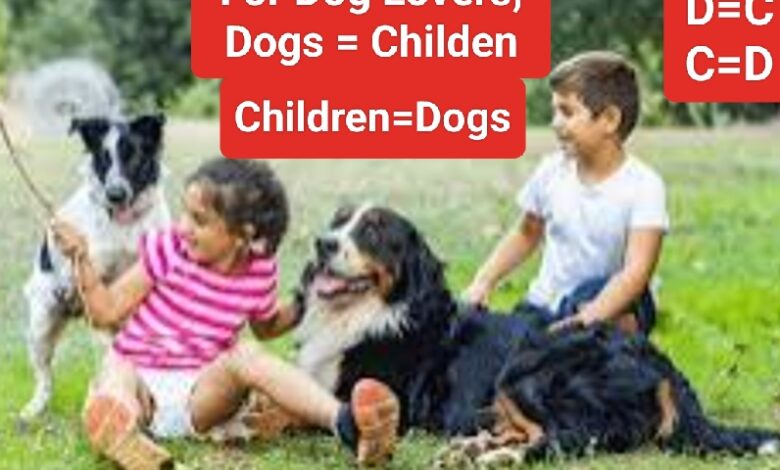Dogs are Their Children*

जब कुत्ते बन गए बच्चे: एक अमानवीय प्रवृत्ति का उदय
प्रस्तावना
भारत में परिवार और संतान को केवल सामाजिक जिम्मेदारी नहीं, बल्कि एक धार्मिक और आध्यात्मिक कर्तव्य माना गया है। परंतु हाल के वर्षों में एक विचित्र प्रवृत्ति तेज़ी से फैल रही है—लोग कुत्तों को अपने बच्चों की तरह पालने लगे हैं। यह प्रवृत्ति देखने में भले ही मासूम लगे, परंतु इसके पीछे छिपा हुआ मानसिक, सामाजिक और आध्यात्मिक पतन गंभीर चिंता का विषय है।
1. पालतू प्रेम बनता जा रहा है विकृति
कुत्तों को प्यार करना, उनकी देखभाल करना — यह कोई समस्या नहीं। परंतु जब कोई व्यक्ति कुत्ते को अपना “बच्चा” घोषित करता है, तो यह सिर्फ एक शब्द नहीं, बल्कि सोच का पतन है।
बच्चे और कुत्ते के बीच के मूलभूत अंतर को मिटाना अमानवीय और राक्षसी प्रवृत्ति है — जहाँ एक जीवन देने और संस्कार देने का पात्र है, वहीं दूसरा जीव केवल संगत और सेवा का।
भारत में एक हालिया सर्वेक्षण में देखा गया कि महानगरों में रहने वाले कई नवविवाहित जोड़े संतान की बजाय पालतू जानवर को “परिवार” का दर्जा देने लगे हैं। इससे न केवल परिवार की धारणा कमजोर हो रही है, बल्कि रिश्तों में भी गहराई समाप्त हो रही है।
2. तलाक और रिश्तों में टूटन का कारण
आज रिश्ते अस्थिर हैं, तलाक के मामले बढ़ते जा रहे हैं। इसके पीछे कई वजहें हैं — उनमें से एक यह भी है कि लोग पालतू जानवरों के साथ भावनात्मक रूप से अधिक जुड़ जाते हैं, लेकिन एक-दूसरे के साथ जुड़ाव कम होता जाता है।
कई मामलों में यह देखा गया है कि जीवनसाथी एक-दूसरे की अपेक्षा पालतू जानवर को प्राथमिकता देने लगते हैं — जिससे ईर्ष्या, अकेलापन और अंततः संबंध-विच्छेद हो जाता है।
3. भारतीय शास्त्रों और ज्योतिष का दृष्टिकोण
भारतीय ग्रंथों और ज्योतिष में स्पष्ट संकेत मिलते हैं:
- बृहद धर्मशास्त्र में कहा गया है:
“श्वान यदि गृह में नित्यवासी हो, तो देवगण वहाँ प्रवेश नहीं करते।”
- ज्योतिष शास्त्र में कुत्ते का संबंध शनि ग्रह से जोड़ा गया है, जो अशांति, विवाद और वैराग्य का प्रतीक है।
- आयुर्वेद में कुत्ते को “राजसिक और तामसिक वातावरण” उत्पन्न करने वाला माना गया है।
यहाँ यह कहा जा सकता है कि घर में कुत्ते को बच्चों की तरह स्थान देना गृहदोष, मानसिक तनाव और आध्यात्मिक दुर्बलता को बढ़ावा देता है।
4. पश्चिमी प्रवृत्तियों की अंधी नकल
इस सोच की जड़ें भारत में नहीं हैं। यह एक पाश्चात्य विकृति है, जहाँ पारिवारिक जीवन में असफलता और अकेलेपन के चलते लोग जानवरों को मानव संबंधों का विकल्प मानने लगे। दुर्भाग्य से, यह चलन अब भारतीय समाज में भी फैल रहा है — विशेषकर शहरी, उच्च आय वर्ग में।
पश्चिमी देशों में “childfree” आंदोलन बढ़ा, और “dog parents” शब्द प्रचलन में आया। अब भारत में भी यह मानसिकता सोशल मीडिया और सिनेमा के ज़रिए फैल रही है।
5. मानव रिश्तों की उपेक्षा और समाज में कुसंग
जब इंसान कुत्तों में स्नेह खोजने लगता है, लेकिन माता-पिता, संतान या जीवनसाथी से दूर होता जाता है, तो यह केवल व्यक्तिगत विचलन नहीं बल्कि सामाजिक विघटन है।
- ऐसे लोग संतान को बोझ और पालतू जानवर को राहत समझने लगते हैं।
- परिणामस्वरूप जीवन में अशांति, असमर्थन और एकाकीपन बढ़ता है।
- बच्चों से दूर रहने की यह मानसिकता भविष्य में जनसांख्यिकीय संकट भी पैदा कर सकती है।
निष्कर्ष: एक आत्मघाती प्रवृत्ति
कुत्तों को बच्चे की तरह पालने की प्रवृत्ति प्रेम नहीं, भ्रम है। यह मानसिक और सामाजिक विकृति है जो मानव सभ्यता, संस्कृति और धर्म — तीनों के मूल स्तंभों को चोट पहुँचा रही है।
यह न केवल वैदिक परंपरा और परिवार व्यवस्था के विरुद्ध है, बल्कि आध्यात्मिक ऊर्जा को भी कमज़ोर करती है।
❗ कुत्तों से प्रेम करें, पर उन्हें संतान का स्थान न दें।
मनुष्य का स्थान केवल मनुष्य ही ले सकता है — न मशीन, न जानवर।
✨ अंतिम संदेश:
“जहाँ कुत्ते भगवान बन जाएँ और इंसान उपेक्षित हो जाए — वहाँ केवल पशुता बचेगी, संस्कृति नहीं।”
*Dogs are Their Children*
I would have stayed away from this topic if new gen couples go for next generation also looking after dogs. I know many divorces happened due to this matter… Not joking, but harsh reality many are not caring to address.
Dogs are not replacing babies, but some people are choosing to prioritize dog ownership over having children, or are treating their dogs like children. This shift is influenced by various factors, including declining birth rates, changing societal expectations, financial considerations, and the desire for companionship and nurturing without the full commitment of parenthood.
Here’s a more detailed look:
1. Declining Birth Rates:
Globally, birth rates are declining in many countries.
Some couples are choosing not to have children or are delaying having them.
This trend is contributing to a greater focus on pet ownership, including dogs.
2. Societal Shifts:
Changing social and cultural pressures surrounding child-rearing can influence decisions about having children.
Some individuals may feel that the demands of modern parenting are too high, or that the world is not a safe place to raise a child.
The perceived loneliness of parents, particularly mothers, in the face of changing family structures is also a factor.
3. Financial Considerations:
Raising a child is expensive, and some people may not feel financially secure enough to provide the life they envision for a child.
4. The Desire for Companionship and Nurturing:
Dogs offer companionship, love, and emotional support, fulfilling a desire for connection and intimacy.
Some people find that dog ownership allows them to experience a nurturing role without the full responsibilities of parenthood.
Dogs can provide a sense of purpose and belonging, and can be a source of joy and happiness.
5. Dogs and Parental Instincts:
Dogs are well-suited to fulfilling nurturing instincts due to their cognitive abilities, capacity for emotional connection, and ability to elicit caregiving behaviors from humans.
Dog is not the issue ,it is becoming a status symbol and replacing humans….
Some studies suggest that looking at dogs activates similar brain regions as looking at human children, particularly in areas related to reward and bonding.
The bond between humans and dogs is often compared to the bond between parents and children, with owners often talking to their dogs in a similar way to how parents talk to babies.
Important Note: While dogs can fulfill certain needs and desires associated with parenthood, they are not a replacement for children. Children have unique needs and experiences that dogs cannot replicate, and raising a child involves a different level of responsibility and commitment.




